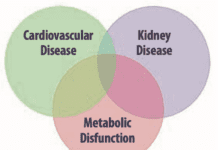Anew meta-analysis suggests that the connections between saturated fat intake, blood cholesterol and heart disease may be more complicated than scientists have thought. Previous studies have demonstrated that saturated fat can raise blood levels of the bad LDL cholesterol, and high LDL is a known risk factor for heart disease and stroke. So it seems logical that saturated fat consumption would likewise be linked to heart disease. But the review of 21 studies totaling 347,747 people failed to find a significant association between saturated fat intake and risk of coronary heart disease (CHD), stroke or cardiovascular disease (CVD).Our meta-analysis showed that there is insufficient evidence from prospective epidemiological studies to conclude that dietary saturated fat is associated with an increased risk of CHD, stroke or CVD, concluded Ronald M. Krauss, MD, of the Childrens Hospital Oakland Research Institute and colleagues, writing in the American Journal of Clinical Nutrition.
| For more on diet and heart disease, see this issues Special Report on How to Take Control of Your Cholesterol, page 4. |
Dr. Krauss and colleagues cautioned that all the studies were observational, and that analysis of clinical trials and underlying disease mechanisms will be required to settle the issue.In an accompanying article, the researchers suggested that one reason reducing saturated fat intake may not have the expected results is that people tend to replace the fat with carbohydrates, especially processed carbs.Its important to look at the big picture, Dr. Krauss added: An overall eating pattern that emphasizes whole grains rather than refined carbs such as white flour, along with foods high in polyunsaturated fats, such as fish, seeds, nuts and vegetable oils, is of more value for reducing coronary heart disease risk than simply aiming to further reduce saturated fat.Current US dietary guidelines call for limiting saturated-fat intake to no more than 10% of daily calories, but the American Heart Association recommends 7%-on a 2,000-calorie daily diet, fewer than 16 grams per day. Dr. Krauss and colleagues, however, concluded, There is little evidence from trials or from epidemiological studies that a reduction in saturated fat intake below about 9% of total energy intake is associated with a reduced CVD risk.Alice H. Lichtenstein, DSc, director of Tufts HNRCA Cardiovascular Nutrition Laboratory, commented, As with all dietary issues it is difficult to isolate a single factor. There are good data to indicate that replacing saturated fat with polyunsaturated fat is associated with decreased risk of coronary heart disease. Hence, the message should really be to displace saturated fat with unsaturated fat.This is consistent with the message from the nutrition community since 2000-moderate, not low, fat intake-with emphasis on unsaturated in place of saturated fat, she goes on. An easy way to do this is to give preference to fats from vegetable, rather than animal, sources.TO LEARN MORE: American Journal of Clinical Nutrition, March 2010; abstract at dx.doi.org/10.3945/ajcn.2009.27725.























